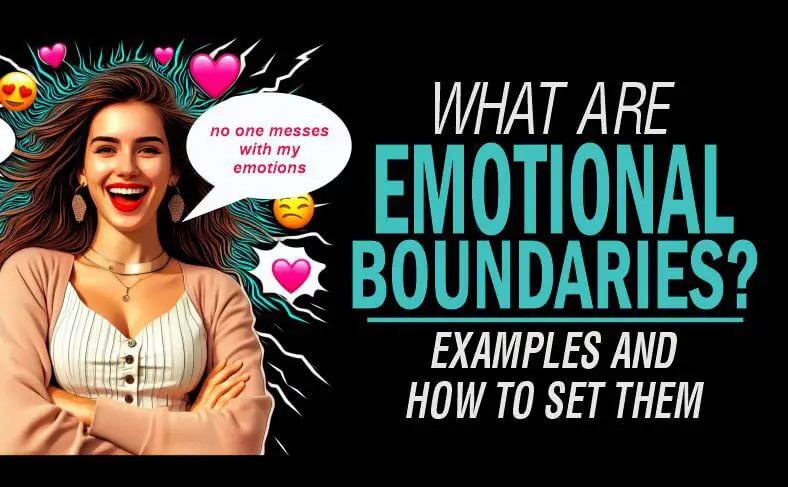Last updated on January 28th, 2025 at 06:50 am
Understand and learn how to set emotional boundaries for successful relationships and navigate personal and interpersonal spaces with clarity and respect.
Emotional boundaries are among personal boundaries that help you be resistant to the manipulations people use to arm-twist and guilt-trip you.
Just like other boundary types, emotional limits preserve your self-esteem and identity while giving you clarity on the choices available to you.
Establishing healthy emotional restrictions helps you block this emotional manipulation while not people who matter in your life.
In this article, we have carefully explained what it means to establish emotional restrictions, types, examples, and how you can establish this boundary for your well-being.
Table of Contents
- What are Emotional Boundaries?
- Benefits of Setting Emotional Restrictions
- Types of Emotional Limits
- Emotional Boundaries Examples
- Emotional Boundaries in Relationships and Dating
- Emotional Boundaries in Christian Dating
- Emotional Boundaries in Marriage
- Emotional Boundaries At Work
- Emotional Boundaries in the Family
- Emotional Boundaries with Parents
- How to Know When Your Emotional Boundaries Are Violated
- Setting Emotional Boundaries
- Watch this Video on the Importance of Establishing Boundaries in Your Emotions
- Frequently Asked Questions
- Conclusion
What are Emotional Boundaries?

Emotional Boundaries Definition
Emotional boundaries are the imaginary restrictions you put around your emotional space to protect you from the toxic manipulations of others.
These are the limits and guidelines you establish to protect your emotional well-being and maintain a sense of autonomy in relationships.
These boundaries define the separation between your emotions and the emotions of others, helping you distinguish your feelings from those of others.
Humans can be cunning enough to manipulate the emotions of others to their advantage.
Healthy boundaries on the emotional level enable you to navigate this manipulation, express your emotions, set limits on emotional involvement, and protect yourself from emotional harm.
These boundaries also promote self-awareness, empathy, and respect for the emotional experiences of both yourself and others.
Related: The Good And Bad Of Rigid Boundaries
Benefits of Setting Emotional Restrictions

1. Self-preservation: Emotional boundaries protect you from emotional harm, allowing you to maintain mental and emotional well-being.
2. Healthy Relationships: Clear boundaries on the emotional level encourage healthier and more balanced relationships by promoting mutual respect and understanding.
3. Personal Empowerment: Setting boundaries empowers you to assert your needs, express your emotions, and maintain a sense of autonomy.
4. Reduced Resentment: Boundaries help prevent feelings of resentment by establishing clear expectations and preventing emotional overextension.
5. Improved Communication: Clear emotional boundaries facilitate open and honest communication, leading to more authentic and meaningful interactions with others.
6. Knowing when to Give Attention or Not: Establishing emotional restrictions helps to gauge the amount of emotional energy we are ready to give and also when it’s okay to share a piece of ourselves or not.
7. Communication Control: It helps us move away or reduce our interactions with people who treat us with disdain, or people who don’t respond with kindness.
8. Freedom to Operate: It gives you the freedom you need to be yourself and operate as you want without undue control.
Types of Emotional Limits
1. Soft Boundaries: Individuals with soft boundaries have porous limits, allowing their emotions to be easily influenced by others. They may have difficulty saying no and tend to be overly accommodating.
2. Rigid Boundaries: People with rigid boundaries have strict limits, often being emotionally distant and unwilling to compromise. They may struggle with intimacy and have difficulty forming close relationships.
3. Healthy Boundaries: Healthy boundaries involve a balanced approach, where you can assert your needs while respecting the emotions and boundaries of others.
Related: How Porous Boundaries May Be Stunting Your Personal Growth
Emotional Boundaries Examples

- Setting an emotional boundary involves asserting your need for personal space and prioritizing your emotional health while offering support to your friend.
- It includes communicating the impact of your partner’s behaviour, and asserting your need for empathy and respect.
- Setting an emotional boundary entails asserting yourself, explaining the impact of your actions, and requesting respectful treatment.
- It may involve creating physical distance to protect your well-being and reinforce acceptable behaviour.
- Setting an emotional boundary involves discussing the impact of their actions on your trust and emphasizing the need for honesty.
Related: Navigating The Waves Of Relationship Dynamics Between Partners
Emotional Boundaries in Relationships and Dating

Emotional limits in relationships and dating involve establishing limits for emotional expression, personal space, and mutual respect for partners.
They enable you to maintain your emotional well-being, autonomy, and individuality within the relationship.
Healthy emotional limits encourage open communication, empathy, and understanding while preventing emotional manipulation, over-dependence, and resentment.
By clearly defining emotional expectations and limits, you can express your feelings, assert your needs, and navigate conflicts with respect and consideration for your partner’s emotions.
How to Set Emotional Boundaries in a Relationship
Setting emotional limits in a relationship involves clear communication of personal needs, expectations, and limits.
It requires self-awareness to identify emotional triggers and assertive expression of these boundaries to one’s partner.
This includes discussing individual comfort levels, respecting each other’s autonomy, and establishing guidelines for healthy emotional interaction.
It also involves recognizing and addressing behaviours that violate these boundaries, fostering open dialogue, and being willing to compromise when necessary.
Setting emotional barriers requires mutual respect, empathy, and a commitment to nurturing a relationship built on understanding, support, and emotional well-being for both partners.
Examples of Emotional Boundaries in Relationships
1. Expressing Personal Needs: Communicating your emotional needs and expectations within the relationship, such as the need for alone time, emotional support, or open communication.
2. Respecting Personal Space: Acknowledging and respecting each other’s need for personal space and time to process emotions or engage in individual activities.
3. Setting Limits on Emotional Support: Establishing boundaries around the extent of emotional support one can provide, ensuring that it doesn’t lead to emotional exhaustion or neglect of one’s well-being.
4. Honoring Individual Autonomy: Respecting each other’s decisions, beliefs, and values, and refraining from imposing your emotions or opinions on the other.
5. Communicating Boundaries: Openly discussing and addressing behaviours or actions that violate emotional boundaries, and being receptive to feedback and concerns from one’s partner.
Emotional Boundaries in Christian Dating
In Christian dating, emotional boundaries involve maintaining purity, respect, and honouring each other’s emotional well-being.
This includes setting limits on physical intimacy, encouraging open communication about personal values and boundaries, and prioritizing emotional connection over physical desires.
It also covers mutual respect’s emotional autonomy.
This is by recognizing and addressing behaviours that may compromise emotional purity and seeking to build a relationship based on trust, understanding, and shared faith.
Healthy emotional boundaries in Christian dating promote a relationship built on mutual respect, spiritual growth, and emotional fulfillment while upholding the principles of the Christian faith.
Emotional Boundaries in Marriage
Emotional boundaries in marriage involve the establishment of mutual respect, understanding, and support while maintaining individual emotional autonomy.
This includes open communication about personal needs, setting limits on emotional involvement, and respecting each other’s emotional space as husband and wife.
It also covers recognizing and addressing behaviours that may violate these boundaries, encouraging empathy, working as a team, and being mindful of each other’s emotional well-being.
Healthy emotional boundaries in marriage promote a balanced dynamic where both partners feel valued, understood, and supported, leading to a relationship built on trust, mutual respect, and emotional fulfillment.
Emotional Boundaries At Work

Just as in relationships, emotional boundaries at work are necessary to check the manipulative emotional activities of colleagues who explore the vulnerabilities of others.
For instance, a senior colleague could delegate their work unjustly to a junior colleague using coerciveness or cajoling as their vehicle.
Being well-rooted in your emotional limits at work will protect you from this manipulation to fend off the request on an emotional level.
Saying ‘no’ might be seen as rude. Applying emotional literacy by giving a genuine excuse can help in such situations.
Emotional Boundaries in the Family
Families are where emotional restrictions are built and confidence is imbued. People who have faulty upbringing struggle with creating boundaries on the emotional level and this spills over to every area of their lives.
Lack of this boundary would result in constant altercations and a lack of peace as offenses would be committed at random.
As close-knit as the family, emotional scheming happens to achieve one aim or another.
A child can use crying to bring down their parents’ boundaries for them to do their bidding.
Emotional Boundaries with Parents

Emotional boundaries with parents involve establishing a balance between autonomy and respect within the parent-child relationship.
This includes asserting your individuality, setting limits on emotional dependence, and personal needs while acknowledging parental support and guidance.
It also entails recognizing and addressing behaviours that may infringe upon these boundaries.
Encouraging open dialogue, and establishing mutual respect is paramount in this regard.
Healthy emotional barriers with parents promote a supportive environment where both parties can express themselves, maintain their emotional well-being, and nurture a relationship built on understanding, empathy, and respect for each other
See a comprehensive article on setting family boundaries.
How to Know When Your Emotional Boundaries Are Violated

We get prompts from our intuition and instincts when our emotional barriers are violated but most people are unable to identify them.
Being emotionally intelligent will help you know when your boundaries are violated.
Here are some of the signs:
- Fear of losing or offending them
- The feeling of being manipulated
- Feeling guilt over issues that are not your fault
- Feeling stressed out because your happiness is constricted or suppressed
- Having anxiety anytime you are around them and do not know what to do that would please them
- The feeling you need your freedom
- You can’t express yourself freely
- You can’t say no
- Their moods somehow sip into your mood that you acquire theirs
- You are anxious and resentful around them
Setting Emotional Boundaries

Just like other personal boundary types, setting boundaries on your emotions is driven by self-protection and survival to keep one protected from other people’s unwanted manipulation and invasion of their emotional space.
1. Accept Yourself
Establishing healthy boundaries on the emotional level starts with accepting yourself and believing you are okay just the way you are.
Having this confidence and self-worth lets you prioritize your needs and not need people to validate you before you feel important.
2. Desist from Taking Unnecessary Responsibilities for Others
When you are given to fixing other people’s problems, taking their fall, and giving up your comfort so you would be liked or approved, you are opening yourself up for a weakened emotional boundary.
3. Say ‘No’ Confidently
The power of saying ‘no’ cannot be overemphasized. It saves you a lot in the future while giving you immediate protection from emotional manipulation.
4. Detach Emotionally from People who Make You Uncomfortable
Emotional attachment is the uppermost reason people don’t have or lose their emotional boundaries.
Somebody whom you are not emotionally attached to won’t violate your boundaries. It is because you are close enough to them for the attachment to happen that they have this effect on you.
Here are some steps to help you establish emotional restrictions:
5. Understand And Identify Your Emotions
Self-awareness is key to establishing emotional limits.
Take time to reflect on your feelings, needs, and values.
Understand what emotions you are comfortable sharing and what boundaries you need to set.
6. Assess Your Relationships
Evaluate your current relationships and identify the ones that may be affecting your emotional well-being.
Reflect on whether certain individuals consistently cross your emotional limits or drain your energy.
7. Communicate Your Boundaries
Once you have identified your emotional limits, communicate them assertively and respectfully with the people involved.
Clearly express what you are comfortable with and what is not acceptable to you emotionally.
Use “I” statements to express your feelings and needs.
8. Be Consistent
Consistency is crucial in setting emotional barriers.
Stick to your boundaries, even if it feels uncomfortable at first.
Reinforce your boundaries with consistent actions and assertive communication.
This will help others understand the seriousness of your boundaries.
9. Practice Self-care
Taking care of your emotional well-being is vital.
Engage in self-care activities that help you recharge and nurture yourself emotionally.
This can include activities such as meditation, journaling, exercising, spending time with loved ones, or pursuing a hobby.
10. Recognize and Manage Guilt
It is common to experience guilt when establishing emotional limits, especially if you are used to people-pleasing or accommodating others’ emotions.
Remember that setting boundaries is necessary for your well-being and does not make you selfish.
But you can be resistant to their scheming if you are deliberate about it without feeling drained.
It takes determination to do this, but you should be propelled by the benefits. The best ways to detach yourself emotionally from people on the emotional level are by:
- Creating value for yourself
- Being busy with things that create value
- Being emotionally independent
- Seek no validation
- Request for space or solitude and be your own company
- Reflect on your needs and priorities
- Resist guilt-tripping
- Rejecting blame that is not your fault
Watch this Video on the Importance of Establishing Boundaries in Your Emotions

Frequently Asked Questions
What are examples of crossing emotional boundaries?
Examples of crossing emotional limits include: sharing personal information without consent, pressuring someone to disclose their feelings, or disregarding another’s emotional comfort.
What is an example of an emotional boundary?
An example of an emotional boundary is expressing the need for personal space, privacy, or respectful communication within a relationship.
Why are emotional boundaries important?
Emotional limits are crucial for maintaining mental well-being, fostering healthy relationships, and establishing mutual respect and understanding.
How can I communicate my emotional boundaries effectively?
Communicate your emotional limits clearly and assertively, using “I” statements to express your needs while respecting the feelings of others.
Conclusion
Without emotional boundaries, you are vulnerable and will live the bitter life of blaming others.
You know the things that upset and dislodge your happy mood. You are responsible for your happiness.
It doesn’t matter if you are married or single. When people make you switch from mood to mood, they are indirectly in control of you.
This is what you have to avoid – people remoting you as they like.
You might not control how people address you and their sinister remarks at you either in the workplace, street, or at home, but you can control your reaction and response.
References:
- Examples of Boundaries on the Emotional Level
- Importance of Boundaries in Relationships
- Boundaries of Emotions and Physical Boundaries
Pious Clements is the insightful voice behind "The Conducts of Life" blog, where he writes about life ethics, self-development, life mastery, and the dynamics of people and society.
With a profound understanding of human behaviuor and societal dynamics, Pious offers thought-provoking perspectives on ethical living and personal growth.
Through engaging narratives and astute observations, he inspires readers to navigate life's complexities with wisdom and integrity, encouraging a deeper understanding of the human experience and our place within society.

